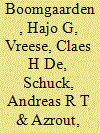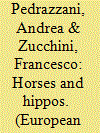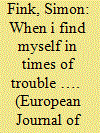|
|
|
Sort Order |
|
|
|
Items / Page
|
|
|
|
|
|
|
| Srl | Item |
| 1 |
ID:
121750


|
|
|
|
|
| Publication |
2013.
|
| Summary/Abstract |
News about the European Union (EU) looks different in different countries at different points in time. This study investigates explanations for cross-national and over-time variation in news media coverage of EU affairs drawing on large-scale media content analyses of newspapers and television news in the EU-15 (1999), EU-25 (2004) and EU-27 (2009) in relation to European Parliament (EP) elections. The analyses focus in particular on explanatory factors pertaining to media characteristics and the political elites. Results show that national elites play an important role for the coverage of EU matters during EP election campaigns. The more strongly national parties are divided about the EU in combination with overall more negative positions towards the EU, the more visible the news. Also, increases in EU news visibility from one election to the next and the Europeanness of the news are determined by a country's elite positions. The findings are discussed in light of the EU's alleged communication deficit.
|
|
|
|
|
|
|
|
|
|
|
|
|
|
|
|
| 2 |
ID:
121749


|
|
|
|
|
| Publication |
2013.
|
| Summary/Abstract |
The European Union has become an important leader in international environmental affairs - particularly through the negotiation of multilateral environmental agreements (MEAs) with favourable terms. In this article, EU environmental leadership is studied from a new perspective, focusing on the ratification stage of environmental regime formation. Specifically, it investigates whether the EU is also capable of motivating third states to join its preferred MEAs. It is argued that third states join the EU's preferred MEAs to signal their compliance with EU environmental standards in an effort to become eligible for various rewards that the EU could potentially offer, including a credible membership perspective, access to its lucrative markets, and aid and assistance. The argument is tested by examining the ratification behaviour of 25 non-EU Member States with regard to all 21 MEAs negotiated under the auspices of the United Nations Economic Commission for Europe (UNECE). The results provide robust support for the theory that EU rewards motivate third states to ratify these treaties. The results withstand a number of statistical tests, even when alternative explanatory factors such as trade intensities, transnational communication and geographic proximity are controlled for. The study is the first large-scale demonstration of the EU's external influence at the ratification stage of environmental regime formation. By identifying three different channels of EU influence, the research permits a more refined understanding of the EU's role as a promoter of environmental protection standards.
|
|
|
|
|
|
|
|
|
|
|
|
|
|
|
|
| 3 |
ID:
121752


|
|
|
|
|
| Publication |
2013.
|
| Summary/Abstract |
Interest groups differ in the strategies they use to influence public policy. Some mainly try to gain access (i.e., have direct contact with decision makers), whereas others tend to 'go public' by launching campaigns that aim to mobilise the broader public. In this article it is argued that group type - namely the distinction between business associations, professional associations and citizen groups - is a major determinant of the choice of strategy. The effect of group type, however, is conditional on the group's endowment with material resources and the issue context: the differences across group types are largest for resource-rich associations and associations active in distributive policy fields. Original data from surveys of national associations in five European countries (Austria, Germany, Ireland, Latvia and Spain) enable the assessment of this argument. The theoretical expectations are supported, with the results having relevance for the normative evaluation of political systems and the positive study of interest group influence.
|
|
|
|
|
|
|
|
|
|
|
|
|
|
|
|
| 4 |
ID:
121753


|
|
|
|
|
| Publication |
2013.
|
| Summary/Abstract |
Scholars interested in legislative processes pay relatively little attention to the changes made to bills in parliamentary democracies. On the one hand, comparative research has often described parliamentary institutions as ineffectual vis-à-vis cabinets throughout the lawmaking process; on the other hand, for a long time the rational choice literature has focused more on the formal rules regulating amendatory activity than on amendatory activity itself. Hence, very few studies have tried to explain how much government bills are altered in parliament and why. This article investigates the changes made to governmental legislation in Italy. Taking the modifications occurring during the legislative process as the dependent variable, a number of explanatory hypotheses derived from both existing scholarship and original arguments are discussed and tested. This also allows the identification of some usually unobserved aspects of the decision-making process within the cabinet. The findings can also be relevant for comparative research since Italy has been characterised during the period under scrutiny (1987-2006) by two distinct electoral systems, two extremely different party systems (pivotal and alternational), governments with various ideological orientations and range, and both partisan and technical ministers.
|
|
|
|
|
|
|
|
|
|
|
|
|
|
|
|
| 5 |
ID:
121751


|
|
|
|
|
| Publication |
2013.
|
| Summary/Abstract |
Most quantitative analyses of policy convergence treat transnational communication in international organisations and domestic economic problems as additive factors. By contrast, this article argues that domestic economic problems motivate governments to search for successful policies, while international organisations offer channels for policy learning. Thus, both factors interact, magnifying each other's effects. The argument is corroborated by a quantitative analysis of the privatisation of telecommunications providers in the Western OECD world. A dyadic logit model shows that joint membership in international organisations increases the likelihood of policy convergence if governments face budget deficits. The argument of the article builds a bridge between theories of international organisations and domestic theories of policy making. Theories of the former gain an important scope condition specifying the conditions under which transnational communication works, while exploring the latter gains a theory specifying where new policy ideas come from.
|
|
|
|
|
|
|
|
|
|
|
|
|
|
|
|
|
|
|
|
|